
Pearl Jam Live
A ball-busting backline, combined with in-ear monitors, and a digital console with absolutely no outboard…? It’s still rock ‘n’ roll Jim, but not as we know it.
What do you do when you’ve got one of the best rock voices in the world under your right index finger? Turn it up of course. According to Pearl Jam’s front of house engineer, Greg Nelson, that’s the key: make sure the guy at the centre of the show – Eddie Vedder – is loud and clear throughout the concert.
And there’s no doubting that Mr Vedder has just such a voice – he’s an extraordinary combination of smouldering baritone and scorching soprano that’s miraculously welded together inside a single larynx. Eddie’s voice is perfectly suited to large concert arenas, and this night – as he would later go on to sing – Rod Laver Arena would be the venue in which he would “scream [his] lungs out till it fill[ed] this room.”
My image of a Pearl Jam concert (derived from the two others I’ve seen in the ’90s) was one based on a simple rock ethic: fire up, turn it up loud (preferably to 11) and go for it! And that’s pretty much what the band is still doing a decade later. There’s no black magic at front of house: no ‘quiet’ stage, no smoke and mirrors, sampled drums or sync’d backup vocals emanating from some mysterious source that no one can attribute to a person at a mic. This is flat-to-the-floor rock ’n’ roll with a diamond at its centre. If the gig falls on its arse the guys on stage have no one to blame but themselves, and as a consequence, every member of Pearl Jam works hard to make sure each concert is a unique experience for the audience as well as its loyal touring party (which still includes long-standing monitors engineer Karrie Keyes, who was on tour in Australia with her two daughters – ‘Don’t call me mother…’).
I caught up with front of house engineer Greg Nelson backstage before the gig and soon discovered that he was very keen to hire a Harley Davidson the next day and hit the Great Ocean Road with some mates. As it turned out, the following day was one of the weirdest, coldest and windiest November days I can ever recall seeing in Melbourne. My prediction to Greg that the weather “would be fine” was proved utterly nonsensical and, needless to say, the Harley idea was shelved… but I also discovered during our relaxed conversation, to my utter amazement, that the only piece of equipment Greg had carried with him on the tour (apart from a toothbrush) was an iLok!
Greg, as it turned out, was mixing Pearl Jam’s front of house sound with not a single piece of outboard gear – no valve preamps, no whiz-bang esoteric compression, no glamourous reverb units – just a Digidesign Venue console and a bunch of plug-ins. You call that rock ‘n’ roll?! Mixing ‘in the box,’ it would seem, is no longer the preserve of home recordists and budget-conscious bands. When the biggest acts in the world are touring with no outboard gear – not even a token analogue stereo compressor – you know the times are a changin’.
I stumbled across this revelation when I fairly innocuously asked Greg at one point: “Can we talk about some of the audio chains?” to which he answered: “Well, everything’s in the Venue console – there’s no hardware at all.”
“You’ve got no outboard of any kind?”
“None whatsoever. None… nothing.”
“No EQs or valve preamps?”
“Nothing… nada.”
“And you’re using the console’s preamps as well?”
“Yep. Everything is in the console: the preamps, the compression, the EQ, everything.”
“Are you sure?”
“Yep.”
It might have taken me a while, but once I’d cottoned on that there was effectively only one piece of equipment controlling the entire show, I almost felt like getting up there and mixing the band myself! So I put it to him…
Andy Stewart: Could anyone get up there and mix Pearl Jam tonight? I have my iLok right here… maybe I could do it!
Greg Nelson: No, and I’ll tell you why. Pearl Jam are a pretty wild bunch on stage and things can change radically during the course of a show. The set list generally flies out the window pretty early on and things can get louder and louder as the gig progresses. Generally their sound needs to be reined in a little bit and you have to be able to anticipate, to some degree, what’s going to happen – that on this or that song Mike [McCready] could suddenly rip into his guitar or Ed [Vedder] might scream unexpectedly into his mic. I’ve been working with them long enough now to generally be able to anticipate what they’re going to do, and I ride the faders accordingly. I s’pose I could use compression to take automatic control over some of these level swings, but I’d rather work the levels manually than have too much compression on everything.
AS: On second thoughts then, maybe I’ll pass…
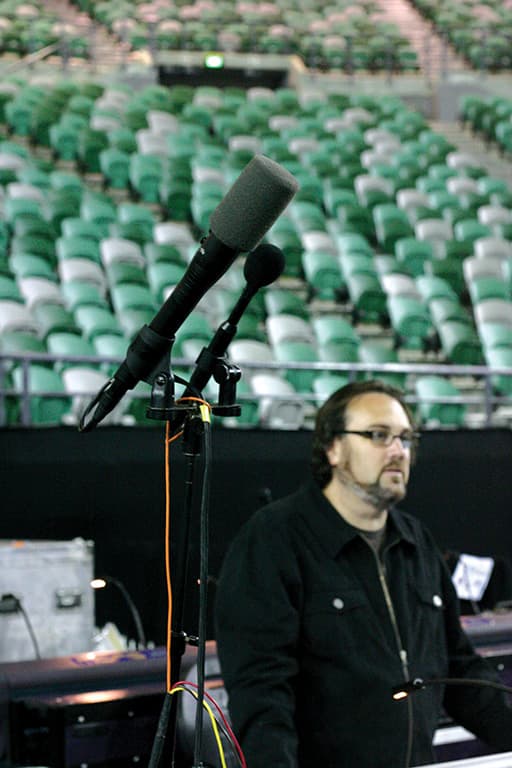
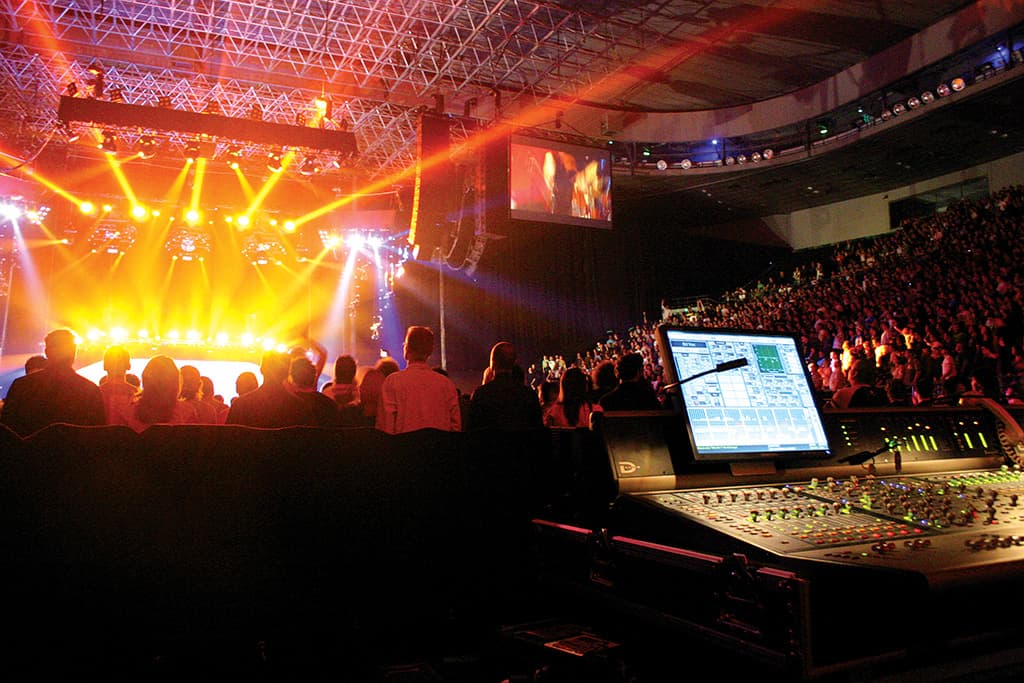

IT’S BETTER MAN
AS: Why are you using the Venue console in place of every other piece of equipment? Doesn’t that make you feel naked?
GN: I was forced to. It’s a pile of shit… but the production manager made me use it! (Laughs). But seriously though, I was introduced to the board by a fellow engineer (and friend of mine), Dave Skaff, who was onto the Venue console right from its inception [Dave is co-incidentally U2’s monitor engineer and talks to AT on page 31] – he was using it on an Alicia Keys tour at that stage. Dave was raving to me about its sound one day and soon after we had that conversation (and as more and more people started using it), word started to spread about this new ‘live Digidesign console’. So naturally I became interested in it and eventually checked one out myself – as it turned out, quite by accident.
I was mixing Pearl Jam on a PM1D at that time and on this one particular occasion we opened up for Tom Petty, whose production setup included the Venue console, so I grabbed the opportunity to take a cursory look at it then. When I played around with it I just saw instantly how easy it was to use. Just messing around on the screen was a cinch, and pretty soon I had the console virtually mastered. I know this might sound conceited but it’s true; it’s so simple; there’s nothing to it really. And later that night the Tom Petty show had an amazing vibe to it sonically – a real high-fidelity sound. After that gig I was pretty keen to try one out myself.
So during a series of Pearl Jam concerts in San Francisco a short time later I had two consoles sitting next to one another. The first thing I did was simply plug a mic into both of them and speak… and – with the PA flat – the difference was phenomenal. It was like night and day and I was very tempted to switch consoles there and then, that very day.
AS: What was so dramatic about these differences you were hearing?
GN: It’s very hard to describe. The sound from the Venue console was just bigger and warmer and better. I’d sensed it during the Tom Petty show; the sound had much more fidelity, I s’pose you’d say. I was amazed. So we did the three San Francisco shows and the next day I switched consoles. At our next gig I used the Venue console for the first time and the band’s soundcheck that night was already better than anything I’d had on tour. Maybe it’s just a personal taste thing, but to my ears, it just sounded so much better. I was sold on the Venue console after that.
AS: Are you a ProTools user? Did that have anything to do with the decision to switch?
GN: I am a ProTools user but that had nothing to do with it. You don’t have to be familiar with that program to drive the Venue. The only thing about the console that has anything in common with ProTools are some of the plug-ins. Other than that, it doesn’t really have anything in common with ProTools at all – other than the fact that you can interface with it for recording purposes a lot easier than any other console.
AS: Do you use the console to record any of the shows?
GN: No we don’t. We’ve got a system that we’ve had in place for almost eight year that works really well. John Burton, who’s worked with the band for several years now, sits on the side of the stage with a rack of his own Grace preamps and a ProTools rig, and records the show every single night. The hard drives then get sent back to Seattle where Brett Eliason mixes the gig and then uploads it onto the Pearl Jam website (www.pearljam.com) for sale as ‘bootlegs’.
AS: Do you ever use the digital console to create scenes for each song?
GN: No I don’t actually. The main reason for that is that, with these guys, it’s hard because the band has a list of about 250 songs that they pull songs off of every night. There is a set list that I’ll get about 20 minutes before the show, but that always changes during the gig, and it’s completely different every night. Ed often calls ‘audibles’ – changing the set all the time – so doing scenes for these guys would be nigh on impossible. And not only that, we don’t really do long production rehearsals either – I’ll get a day with them if I’m lucky. There’s none of that ‘sitting in a room for four weeks of pre-production’ that some other bands get into.
AS: That’s one of the temptations of the digital console revolution, of course; that potential for over analysing a set and manicuring it to within an inch of its life…
GN: Absolutely, absolutely. And some guys are into that but these guys definitely aren’t! This whole move to digital hasn’t changed Pearl Jam’s working methods at all. They’re not inclined to go for that ‘we could spend more time and make everything perfect’ type philosophy.
NOTHING MAN
AS: Do you have any special mixing tricks up your sleeve for Pearl Jam?
GN: I wish I could say I did, but I don’t, to be honest. I’m not a very fancy guy. I’m kind of a straight-up guy and I try not to over-complicate the situation too much. The band tends to get up there and go a little nuts and there’s a lot going on most of the time. There are three guitar players and a bass, and those instruments combined with Matt [Cameron] going ballistic on drums can be an insane amount of stuff sonically. In situations like that, if you try and over-complicate the mixing process it just muddies it all up. So I don’t really have a lot of special tricks. I like to keep it simple, let the band do their thing and just use my ears.
AS: Pearl Jam generally only plays fairly big venues presumably, does that lend itself to fairly dry mixing?
GN: Yeah, it does – unless we’re outside, the mixes are generally pretty dry. I have some reverb on the drums, obviously, and a little bit on Ed’s vocal but that’s about it. There are no fancy delays or vocal doubling or anything like that. And if we’re playing in a really ‘live’ venue it’ll basically be bone dry.
But that’s certainly not the case here tonight. Rod Laver Arena is an amazingly ‘dead’ venue for a space this size – it has to be one of the deadest large venues I’ve heard. I love it – so I’ve been playing around with some reverbs during soundcheck to give the sound a little more depth. And we had a great show here last night. In fact, all the arenas we’ve played here in Australia: Acer Arena (formerly Sydney Superdome) sounded absolutely amazing, that’s a beautiful sounding arena; the Brisbane Entertainment Centre sounded great too. In fact, all of the buildings we’ve played in over here have sounded much better than some of the arenas in The States. A lot of those are designed to be highly reflective for the ‘hyped’ atmosphere of sports… they’re absolutely awful.
ROCK ‘IN THE BOX’
AS: You mentioned earlier that you’re touring with Pearl Jam without so much as a stick of outboard gear… is that literally the case?
GN: Yep. Everything is in the console: the preamps, the compression, the EQ, everything. I used to have a Focusrite Blue 330 on Ed’s vocal to give it a little bit of ‘warmth,’ but now I’m doing absolutely everything in the digital domain. When I first started using the Venue, as soon as I turned Ed’s vocal mic up, I realised I didn’t need any outboard gear any more.
AS: Well, given that there are no audio chains as such, what plug-ins are you using on Eddie’s vocal for instance? (I can’t believe I’m asking you this… I feel like we’re talking about a DAW mix!)
GN: Well the main thing I’m using on Ed is a plug-in by Crane Song called Phoenix. I’m using that on a lot of stuff actually. I’m also using the Serato Parametric EQ, and a compressor called Smack, which I think has a lot of the qualities of a Distressor… and that’s it. Oh, and a little bit of ’verb.
AS: And does the vocal get a fair hiding or do you leave it fairly open and dynamic?
AS: It’s fairly dynamic and I mix it way out front. Everyone wants to hear what Ed has to say so I have him well up in the mix. And he also tends to speak very quietly so it definitely has to be out there to get that articulation. I have my hands on the vocal fader most of the time to make sure the vocal never gets lost. And, although this sounds like a situation where you might be inclined to use lots of compression, the compressors on Ed’s voice aren’t working hard at all. The only time they really kick in is when he screams. When he’s singing normally they’re hardly doing anything. The compressors are really only there for safety’s sake. They’re not in the chain to create ‘a sound’. The Phoenix affords the vocals some colour, but Ed’s voice is so deep and rich it doesn’t really need a lot of colour. It just needs to be heard.
AS: What mic are you using for main vocals?
GN: Ed’s singing into an Audix OM7 – I think he’s been singing into that since the mic came out! The Audix OM7 is a low gain mic that needs a lot of preamplification to really make the thing work, and until recently, I often had a lot of problems with mic noise. With the gain cranked wide open through 300 feet of cable it would get noisy. But now with a digital loom I have 25 feet of cable instead of 300 and the noise is gone.
AS: Do the guitars get the same minimal treatment as vocals?
GN: Yeah, guitars are pretty much straight up. I use some of the Bomb Factory Pultec plug-ins to fatten them up, but not much else. I don’t compress the guitars at all. The only compressor plug-ins I use are Smack; Impact, which is really great; and a Fairchild 660, which I use on the acoustics mainly. But that’s really it.
AS: What about guitar amp mics and mic placement? Is that a simple affair too?
GN: Pretty much. Yeah. As for mics, we’re using [Sennheiser] e609s, [Shure] SM57s and [Audio-Technica] AT4050s scattered across the various amps. Mic placement, however, is generally left to Karrie who generally tries to keep me off the stage as much as possible (laughs). Most of the amps on stage are Marshalls and Fenders… Ed’s got a couple of Fender Deluxes… and Mike still plays through his Trentino amplifier.
AS: And what plug-ins, if any, do you have strapped across the mix bus?
GN: The only thing across the bus mix is the Crane Song Phoenix. The Crane Song just makes everything sound bigger. But I’ve never been a big one for large amounts of mix bus compression anyway. Even when we were using the Al Smart C2, which is an awesome compressor, we just had it barely twitching. Live, you want that dynamic. You may not want it in the recording realm, but live I think it’s important.
AS: What about reverb?
GN: I’m using Revibe on pretty much everything.

IT’S EVOLUTION BABY…
AS: The concept of a full-blown rock band going through a digital console with no outboard gear whatsoever would have seemed almost laughable a few years ago. Would you say this is a watershed time?
GN: Well, yeah it is. I love it. There are a lot of huge bands doing front of house this way now. No hardware makes things easy, that’s for sure. I came down here today with my iLok and my USB key and that’s it!
AS: So the days of ‘My outboard rack is bigger than your outboard rack’ are long gone it would seem.
GN: There’s none of that any more, although I never really played that game to be honest. There are still guys out there with some outboard, of course. But a new era of lightweight production has certainly been born… and accountants love it, production managers love it. After all, plug-ins are so easy to ship!
STAGE VOLUMES
AS: Regarding stage volumes etc, do you have any influence there?
GN: No, that’s a lost cause. Pearl Jam love it loud on stage and if you tell them to turn down during soundcheck, by halfway through the show it’s just back up on 11 anyway, so I’ve given up on trying to control their volumes. I just let them do what they do and mix around it. And we’re playing such huge venues its doesn’t really matter too much. I mean there’s spill into Ed’s mic but you just have to work around it.
AS: Are they using wedges or in-ears these days?
GN: They’re all on ears. Ed uses one ear and wedges and the other guys are all on ears, which has helped the stage volume come down quite a bit. The volume’s not that bad when you’re 150 feet away, of course, but I feel sorry for the poor bastards in the front row sometimes.
AS: I’m sure they’ll put up with it… (laughter). Perhaps someone in the front row should ask them to turn down…
GN: I wish them luck!




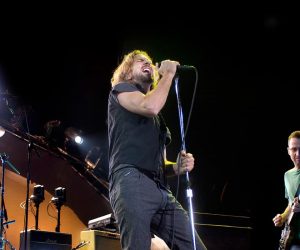


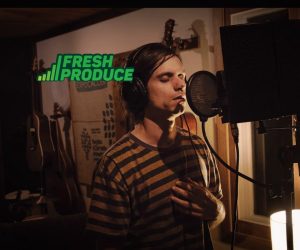
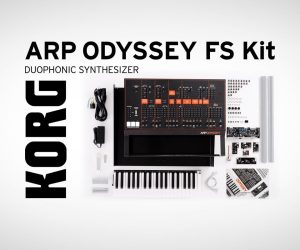
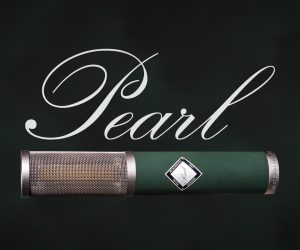






RESPONSES